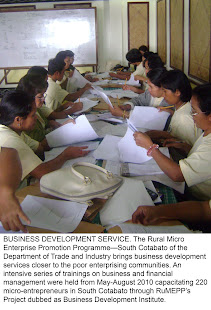Text/ Photo: Ernesto C. Casiple, Jr./ PGO—Kalinaw
Following the continued support to lasting peace in Mindanao, Tuyan Elementary School (TES) in Malapatan is established as School of Peace. Declared as the very first school of peace in SOCSARGEN Area, “TES will become a learning institution committed to promoting basic quality education that is grounded upon the universal values of a culture of peace,” according to Rey Tan, Deputy National Programme Director of ACT for Peace Programme. He added that it seeks to strengthen capacities on integration and mainstreaming of the Culture of Peace principles through Peace Education and Teacher Education.
Mainstreaming Peace Culture
Generally aiming to contribute to the overall peace and development efforts of institutionalizing peace education in Southern Philippines, the establishment of the School of Peace is also in support to the implementation of Executive Order # 570 mandating Department of Education to promote peace education.
Mamerto Tolentino, Division Peace Coordinator of DepEd Sarangani, said that DepEd is thankful for the initiative of Kalinaw Sarangani and ACT for Peace Programme for strengthening peacebuilding efforts in Sarangani. He emphasized that with the establishment of the School of Peace; there will be sure increase of tri-people understanding and cross-cultural mutual relationship among the children.
On May 5-7, 2009, following the agreements during exploratory meetings, the teachers of Tuyan Elementary School and other stakeholders (including BLGU and PTCA officials and representatives from DepEd, SK Malapatan and Provincial Government and some teachers from Liwanag ng Kapayapaan Foundation in Quezon City) attended a training on the Culture of Peace for Peace Educators at Durian Garden Polomolok South Cotabato. The training that was facilitated by Prof. Estrella Cantallopez of Notre Dame University in Cotabato and Mr. Ronald Hallid Torres of MSU—Maguindanao was the initial step towards the development of TES as a peace school.
According to Engr. Cynthia C. Guera, SCM—Program Manager of the ACT for Peace Programme, the activity is a support to the key thrust of the programme to work with the culture bearers such as the academe in order to multiply peacebuilding concepts and principles with the youths.
George P. Young, Jr., Peace Program Officer of Sarangani Province, added that the establishment of a peace program for the Province helps in sustaining peacebuilding initiatives of supporting agencies and programs like the ACT for Peace. He assured support to the development of Tuyan Elementary School as a School of Peace.
On the three-day COP Training, the trained peace educators learned peacebuilding concepts and tools that will help implement peace education strategies. Understanding Mindanao history and the complexities of peace and conflict were also highlighted during the training. On the other hand, ACT for Peace Deputy Program Manager Rey Tan also oriented the participants on the school of peace framework. Tan remarked that the establishment of a school of peace is also akin to the establishment of a community of peace.
Furthermore, the training was also a venue for the key staff/ teachers of Liwanag ng Kapayapaan School Foundation and Tuyan Elementary School to share experiences on peace mechanisms, learning, and reflections in the operation of their respective schools.
Launching Day
Immediately two weeks after the peace culture training, Tuyan Elementary School was formally launched to public as a School of Peace on May 21. The launching gained multi-sectoral and multi-institutional support. According to Edgar Egano, Head Teacher of TES, parents and community members of Barangay Tuyan in Malapatan also extended support by attending the launching.
The launching day which was described as a festivity by some teachers, gathered around 500 visitors and guests. No less than Mayor Aida Singcoy, represented by Hon. Kagawad Felipe Pulanco, gave the overall message of support to the School of Peace Project. She thanked the ACT for Peace initiative of conceptualizing the project.
Meanwhile, Asst. DepEd Sarangani Division Superintendent, Isagani dela Cruz expressed how thankful DepEd is for the multi-institutional effort of helping implement peace education as mandated in EO 570. “Truly, with all stakeholders coming together, this project will impact a lot in peace and development in Sarangani.”
Integrating Peace Values
in Lesson Plans
The challenge for teachers of Tuyan Elementary School is the implementation of peace education strategies. More importantly, the inclusion of peace values in all subject areas including Math and Science is painstaking and difficult. But on June 5-7, the teachers of TES, together with BLGU representatives, went to Cotabato City for a Peace Lesson Planning and Enrichment Workshop.
Facilitated by Dr. Myrna Tubigan and Prof. Estrella Cantallopez, both from NDU—Cotabato, the workshop gave them hands-on experience of integrating peace values in all subject areas taught at school. The facilitators expected that from then on, the teachers of Tuyan will subsequently include peace values both in lesson planning and in actual teaching practice.
Experiences in managing and implementing School of Peace were also shared by Agney C. Taruc, principal of J. Marquez Integrated School of Peace in Cotabato and Apollo P. Gamas, peace coordinator of Broce Central School of Peace in the ARMM.
Meanwhile, the visit of DepEd Regional Peace Coordinator, Pancho Balawag, came as a surprised to everyone. He challenged everyone to make every School of Peace in Mindanao a model of cross-cultural understanding and sharing and shall always avoid miscommunication and competition.
Moving Forward
In order to mainstream peace education in the basic education curriculum, strengthen the capabilities of administrators, teachers, and stakeholders in peace advocacy; and strengthen partnership among stakeholders in peace advocacy, a more visible multi-institutional support is encouraged by Balawag.
As a result, teachers of Tuyan Elementary School with other initial partners are planning to conduct a convergence forum for all institutions that would like to support the School of Peace through physical and intangible projects.
On the other hand, the peace and development program of Sarangani (Kalinaw Sarangani of the Provincial Governor’s Office), will conduct a culture of peace training to school heads, principals/ guidance counselors, in support to mainstreaming peace education at the elementary and secondary education level.

